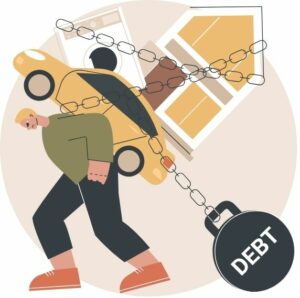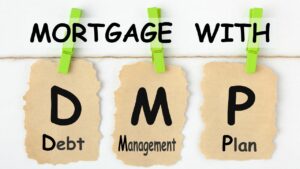Getting a mortgage after bankruptcy is challenging but possible. You’ll likely face higher interest rates and may need a larger deposit. Time is key; improving your credit score and waiting a few years after being discharged from bankruptcy can increase your chances of securing a mortgage.
Bankruptcy can be a daunting experience, especially considering many of the debtor’s assets could be used to repay the outstanding amount.
But it is not the end of the road for home ownership. While it is true that such a situation significantly impacts your creditworthiness, it is still possible to obtain a mortgage after bankruptcy.
Several specialist lenders grant approval to individuals who have defeated bankruptcy, or are in the process of doing so.
You will have the possibility to own a home again if you complete the required waiting period and follow other relevant measures to meet the eligibility criteria.
Hence, if you want to get a mortgage after bankruptcy, you will require proper guidance.
Some of the best ways to get a mortgage after bankruptcy is to make future repayments on time, build credit score, and manage an emergency fund.
In this blog post, we will discuss everything you need to know, so let us begin!
Table of Contents
What Is Bankruptcy?

When a legal proceeding is started against a person or business for failing to repay their obligations or debts, it’s called a bankruptcy.
A bankruptcy law allows for certain debts to be reduced and sets a timeline during which nondischargeable debts have to be repaid. You can also repay secured debt under this law, which includes real-estate or vehicles that are offered potentially as collateral.
Bankruptcy proceedings begin when a debtor files a petition. Then the assets of the debtor are measured so that the outstanding amount can be repaid quickly.
How Does Bankruptcy Impact Creditworthiness?
One of the main ways bankruptcy impacts individuals’ creditworthiness is by affecting their ability to get future credits. It is a legal process that is applied to people who cannot pay their debts.
This process helps bankrupt individuals get back on track, but it comes with its own set of restrictions. For instance, once someone is declared bankrupt, it is recorded in their credit file. This mark can stay on the report for as long as six years.
Due to this, it can be challenging for bankrupt individuals to get credit for things like mortgages easily.
In most cases, even bankrupt people who qualify for mortgages are charged a higher amount of interest due to their history of being unable to pay back the borrowed sum.
How To Rebuild Credit After Bankruptcy To Buy A Mortgage?
1. Stick To A Budget & Show Good Reliability for Future Credit Payments
One of the best ways to start rebuilding credit after bankruptcy to attain a mortgage is to establish a budget.
A great way of formulating an attainable budget is to map out all your essential expenses and focus on them first, such as food, utilities, housing, and transportation bills.
Make sure to set a specific portion of your income to these necessities and you can move on to gradually paying off your remaining debt or alternatively building up an emergency fund.
Additionally, If you stick to your set monthly budget, this should also allow you to put a part of your salary away for savings as you have not used all of your income on your expenses.
Always try to stay above the minimum benchmark as you pay the debts back every month to demonstrate your financial commitment to becoming more responsible.
The act of honouring your financial obligations by paying debts will affect your creditworthiness in a positive way and, over time, will help you attain a mortgage more easily.
2. Make Repayments
Remember that payment history determines a large percentage of the FICO Score calculation. Hence, one of the best ways to recover after bankruptcy is to make timely repayments.
You should also monitor the credit score each month and try to stay on top of other bills, which will help boost the score.
3. Emergency Fund
It’s always a good idea to have an emergency fund, so keep money aside for unexpected expenses. For instance, saving a little bit each month will help you pay medical bills or carry out car repairs without any problems should they occur out of the blue.
This will ensure you don’t incur future debt and allow you to rebuild credit without lapsing again.
4. Lower Your Credit Balance
Your credit balance contributes to 30% credit score calculations, and lowering your credit balances is essential for rebuilding credit after bankruptcy.
For this, you should pay outstanding amounts each month and lower card usage. This will show no longer a reliance on credit additionally.
5. Be Patient
Once you are declared bankrupt, there is no point rushing the legal process or trying to hurry through the path of recovery.
Instead, it would be best to take your time and stay patient because the time it takes to rebuild credit varies from one borrower to another.
What Is The Waiting Period For Applying For Mortgage After Bankruptcy?
While several factors influence how long you will have to wait before applying for mortgages after bankruptcy, it mainly depends on the type of lender you approach.
For instance, some may discuss the process of getting the mortgage months after your bankruptcy sooner while others may put you on hold for many years.
It is worth noting that the overall process of getting a mortgage since bankruptcy gets easier the longer you wait typically. For instance, once you have made it through the first year of your bankruptcy discharge, you can apply for a mortgage with some lenders.
However, you will more than likely be with lenders who lend at very high rates, and you may also have to provide a higher deposit.
Similarly, between the period of two and three years after discharge, you can approach a wider variety of lenders with theoretically better deals. And after four to five years, you may slowly be able to access the same lenders as people with a clean credit profile do.
You should ensure that your creditworthiness is up to the standards that the lenders expect, irrespective of what waiting period after bankruptcy you are looking for to attain a mortgage. If you opt to wait six years, you will be able to get a standard mortgage in most cases.
When you cannot wait for that long, it would be a good idea to consult a professional mortgage advisor to help you out.
Of course a big element is how you have maintained your credit file after bankruptcy and your financial circumstances after this will be closely underwritten.
Tips To Meet Lender Requirements To Get Mortgage

1. Prove Your Financial Stability
Lenders always want to ensure that they only deal with borrowers who are financially stable, especially after a bankruptcy. Hence, bankrupt individuals must prove they can pay for their mortgages.
One of the best ways to do so is to maintain a stable income. Ensure that you are working in a secure environment for a long duration to pay back the borrowed sum on a routine basis.
Providing your lenders with a decent debt-to-income ratio will increase your chances of getting your mortgage application accepted alongside you being able to provide a higher income multiple than the amount being borrowed, as this should evidence a high level of disposable income against your expenses.
2. Save For A Larger Deposit
While regular employment is one of the minimum pieces of criteria to meet lender requirements, it’s important to consider other measures such as your credit score and saving for a larger deposit.
Especially after bankruptcy, having a larger deposit can help increase your chances of getting your mortgage application accepted by lenders.
This happens because high deposits significantly reduce the loan-to-value ratio. As a result, lenders have more confidence that there is less of a possibility of being in a negative equity situation, thus resulting in your mortgage application being accepted.
It would be best to consider saving for larger deposits during your period after bankruptcy.
3. Consult A Professional
Getting a mortgage after bankruptcy is not an easy task and sometimes the steps might be frustrating to deal with. In such cases, it would be best to consult a reputed mortgage advisor to help you out.
It would help if you considered going for professionals who have ample experience in helping individuals with bad credit and bankruptcy to get a mortgage.
Consulting a professional has its share of benefits, such as tailored advice and guidance throughout the application process.
A good mortgage advisor will help you narrow down to mortgage lenders who best fit your preferences.
FAQs
1. Can I increase my credit score after bankruptcy?
Yes, it is possible to improve your credit score after bankruptcy. However, you must pay all your bills on time and establish a good credit record.
It may take about four to five years for you to reach this score or overall credit profile you require, but responsible financial behaviour can definitely make it possible.
2. Can I get a mortgage after several bankruptcies?
Yes, you can get a mortgage even after several bankruptcies. However, it will be a very challenging task, which is why you should focus on maintaining a good credit score after your latest bankruptcy. It would help if you also considered contacting a professional to guide you through the process.
3. Can I apply for a government-backed mortgage program after bankruptcy?
You can access several government-backed mortgage programs. However, be sure that you go through all the relevant guidelines and eligibility criteria before applying for them.
Conclusion
While bouncing back from financial turmoils like bankruptcy may seem impossible at times, you can follow certain measures to get back on track gradually.
If you keep certain aspects in mind and follow the tips mentioned above, your mortgage application will most likely be accepted.
With patience, responsible financial management, and a strategic plan – you can gradually build your credit score and get your mortgage.
Your home may be repossessed if you do not keep up repayments on your mortgage.
All content is written by qualified mortgage advisors to provide current, reliable and accurate mortgage information. The information on this website is not specific for each individual reader and therefore does not constitute financial advice.
Our goal is simple - to provide most up-to-date and accurate mortgage information to make your mortgage journey as stress-free as possible. Have a question? Fill up the quick form and one of our mortgage advisor will connect with you.








